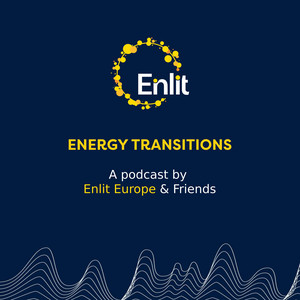
Reshaping the industry through tech and leadership
Energy Transitions
The energy sector is facing multiple challenges that require innovation that goes beyond technology. From energy security to economic turbulence and a changing energy mix, it has been a bumpy road for the energy industry in the past few years. In this episode of the Energy Transitions Podcast, Pamela Largue spoke to Claudia Blanco of GE Vernova about the role of policy, technology and specifically leadership in solving these challenges now and for future generations. During the conversation, that took place at Enlit Europe 2023 in Paris, Blanco speaks passionately about the progress that has been made so far, for example in terms of making gas plants hydrogen-ready. However, she also addresses the fact that there is a significant skills gap and that she believes that there is a lot to be done to make the industry more attractive.
16 min 17 sec

The green promise of next-gen fuel cells
Energy Transitions
In this episode of the Energy Transitions Podcast, Pamela Largue speaks to Caroline Hargrove, CTO at Ceres, about solid oxide fuel cell technology and the record levels of efficiency being achieved. Ceres, a UK-headquartered climate technology developer, recently won the 2023 MacRobert Engineering Award. The award celebrates innovation that makes an impact, and Ceres’ reversible fuel cell technology, capable of generating power from a range of different fuels, is doing just that, explains Hargrove. “We, over 20 years, have been developing this technology that is in this goldilocks temperature range, which is about 600 degrees …they become a lot more efficient than the low temperature fuel cells…In an industrial application, efficiency matters…" In this Energy Transitions Podcast episode, Hargrove also unpacks the potential of fuel cells to decarbonise hard to abate sectors and discusses the importance of establishing an effective supply chain, making fuel cells at an affordable price and ensuring they are fit for purpose.
27 min 3 sec

Overcoming funding pitfalls for net-zero projects
Energy Transitions
The built environment is one of the main sources of carbon emissions but it also provides one of the most opportune spaces for clean tech project development. Behind the meter, energy efficiency and demand response projects, in particular, could make a significant contribution towards lowering the carbon footprint of buildings and the infrastructure that connects them. However, barriers to project development and finance must be overcome in order to spur progress towards net zero and empower all players, especially small and medium sized enterprises. In this episode of the Energy Transitions Podcast, Yusuf Latief spoke to Jessica Stromback, CEO of Joule Assets and Co-Founder of the Sustainable Energy Finance Association (SEFA), regarding the practical steps to figuring out financing and bringing net-zero projects to life. To listen to other episodes: https://www.enlit.world/podcasts/energy-transitions/
25 min 56 sec

The cost of Europe's copper crunch
Energy Transitions
In March this year, the European Commission released the Critical Raw Materials Act to ensure a sustainable, domestic supply of materials to support the green and digital transitions. But are these measures enough to keep Europe competitive and progressing adequately towards net zero? And more specifically, what would a copper shortage mean for the continent’s decarbonisation journey? To explore the consequences of the copper crunch and unpack strategies to strengthen the supply chain, Pamela Largue speaks to Layla Sawyer - Secretary General - currENT Europe.
21 min 22 sec

Cybersecurity innovation at the core of digital transformation
Energy Transitions
Dr. Judith Wunschik, Chief Cybersecurity Officer at Siemens Energy discusses all things cybersecurity and what it means for the digital transformation of the energy industry.
26 min 51 sec

Talking pros and cons of EU's electricity market reforms with EFET
Energy Transitions
Now that the European Commission has published its proposal for electricity market design reforms, Patrick Bauduin talks to Maria Popova, Director for Carbon Neutrality and Renewable Electricity at the European Federation of Energy Traders (EFET), about what was proposed and what the implications of those proposals could be for Europe.
17 min 38 sec

Europe’s urgent need for flexible balancing power
Energy Transitions
Without energy market reform to boost flexible balancing capacity, Europe could miss out on achieving its ambitious renewable energy goals. That was the bottom line of a report from Wärtsilä that focuses on managing system imbalances of a renewable-based energy system. To discuss the report’s findings in more detail and to unpack measures needed to attract investments into flexible power, Pamela Largue spoke to Anja Frada, chief operating officer, Wärtsilä Energy. Frada delves into the importance of creating a technology agnostic capability market and improving price transparency. She also talks about why we can be hopeful about the next decade, what challenges need to be addressed and how we go about mitigating risks to our energy system of the future. Resources: Energy Market Redesign: For a Decarbonised Europe
17 min 33 sec

Weighing the true cost of carbon capture
Energy Transitions
With net zero requiring 7 billion tonnes of CO2 to be captured and stored annually by 2050, Ruth Herbert, CEO of CCSA, highlights the long but critical road ahead for carbon capture technology. The sector had a slow and tedious start, as the cost and disruption of CCS projects hindered deployment. Herbert explains, however, that the true cost of delaying CCS could be devastating for our net zero goals and that by moving early and decisively, we can ultimately ensure a cheaper transition.
20 min 20 sec
